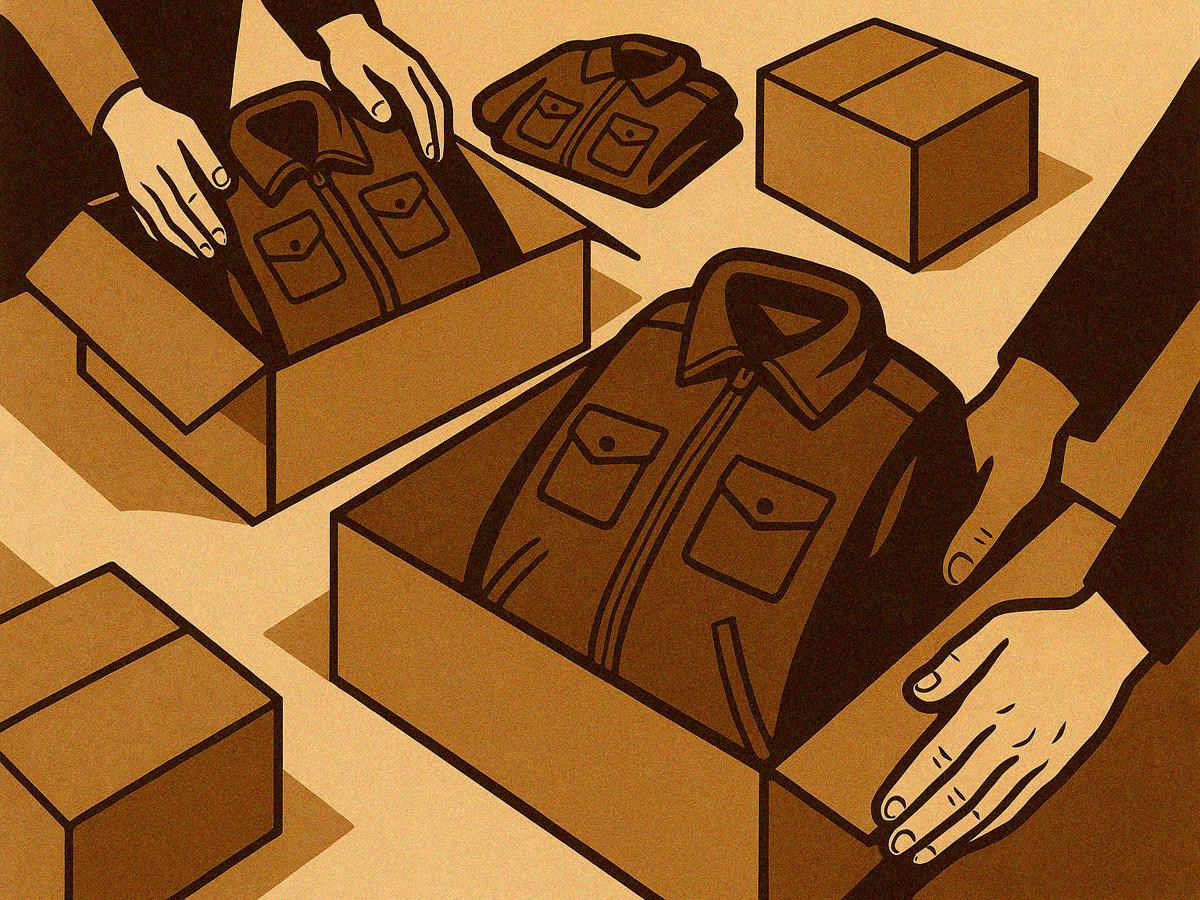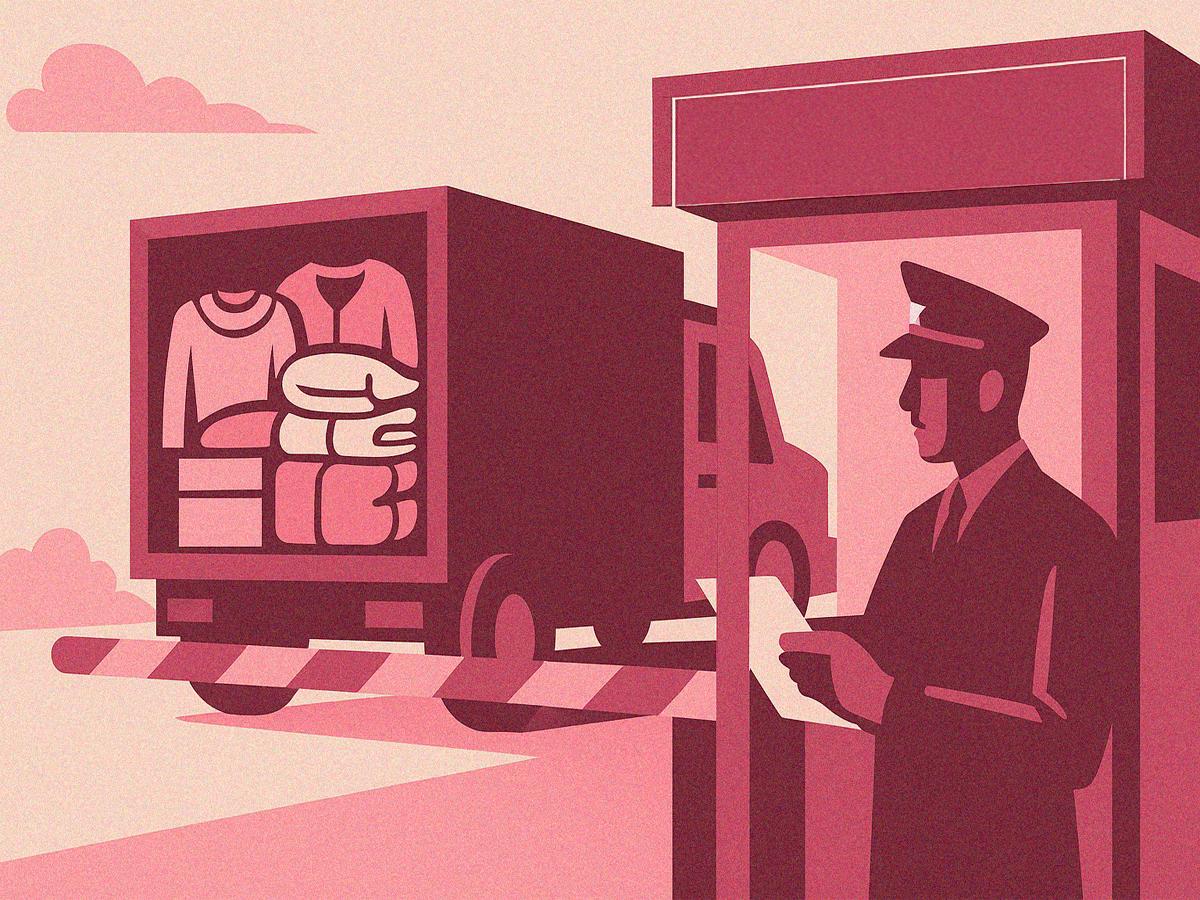This investigation was done jointly with the Lithuanian investigative center Siena and the Russian project Chronicles Media, with the support of the activist group CyberPartisans.
Cheap luxuries
Have you ever seen a new authentic Balenciaga jacket for $4? Or a quilted vest from Dolce & Gabbana for $6.5? These are the prices in the customs documents of a Belarusian company that delivers branded clothing from the EU to Russia.
After the full-scale Russian invasion in Ukraine in February 2022, most Western luxury brands, such as Christian Dior, Louis Vuitton or Gucci, suspended their operations in Russia. On March 11, 2022, the US Department of Commerce banned the export of clothing, footwear, bags, perfumes and other “luxury goods” to Russia and Belarus if their wholesale price exceeds $1,000 per unit.
On March 15, 2022, the European Union adopted a similar sanctions package against Russia, but with a lower price limit — €300 per unit. In June 2024, the EU imposed similar restrictions on the export of luxury goods to Belarus for its involvement in Russia’s war of aggression against Ukraine.
However, there are ways to bypass these restrictions. On Facebook a company that calls itself Belcargo promises delivery from the EU to Russia “without price restrictions”. [*]
Here is what Belcargo wrote on September 11, 2024: “Price advantage: by ordering delivery of goods through us, recipients of the cargo avoid having to pay duties on goods that cost over 1,000 euros. This is especially relevant for luxury brands, the price of which significantly exceeds this amount”.
Price is not important
We contacted Belcargo via WhatsApp under the guise of clients to place an order. The company offered us the following delivery scheme:
– We purchase the clothes ourselves – for example, in an Italian online store.
– Then either the seller sends the parcel to a warehouse near Vilnius, Lithuania, or Belcargo itself picks up the order in Italy and delivers it to Lithuania.
– There, the goods are documented and then delivered to Russia. [*]
The communication with the company showed that the actual price of the purchased goods did not really matter. We ordered 10 men's jackets from luxury brands – such as Brunello Cucinelli, Cortigiani, HERNO and Fradi. We named the total price of €1,730 instead of the actual €6,450. Belcargo did not have any questions about this or any worries that the actual prices per unit might violate the EU ban, although these prices are easily found on the internet. [*]
When importing such goods into the territory of the Eurasian Economic Union — in this case, Belarus — you need to pay 10% of the price in customs duties and 20% in value added tax (VAT). The difference between fake and real prices significantly reduces these payments. For example, the difference in such payments for our batch of 10 imported Italian jackets would be about €1,500.
Who is behind the mask
The contact numbers on one of Belcargo’s websites lead to the Russian company Pascaltrade. We have found this company in the Russian customs data as a recipient of large quantities of luxury brand clothing from the EU.
Pascaltrade’s sole supplier is а Belarusian company called OOO Torgovyi Dom Exporttorg.
The company has links to the businessman Alexander Zaytsev (Zaitsev, Zaitsau), a former assistant to Viktor (Victor) Lukashenko, the eldest son of Belarus' ruler Aleksandr Lukashenko. According to EU documentation, Zaytsev was sanctioned as a person close to the Belarusian ruling family.
From 2020 till mid-2021 Zaytsev was listed as the owner of Torgovyi Dom Exporttorg. The next owner, Yauheni Krakhotsin (Evgeny Krokhotin), had worked for more than 7 years for Zaytsev-owned company OOO Stiskho. Since August 2023, Torgovyi Dom Exportorg has been owned by Anna Yelpayeva. She had worked for the company OOO VLATE Logistic previously owned by OOO Bremino Group, which in turn is co-owned by Zaytsev and two other businessmen close to the Lukashenko family – Aliaksei Aleksin (Alexei Oleksin) and Mikalai Varabei.
Torgovyi Dom Exporttorg, in turn, buys clothing that it imports into Belarus via Lithuania from an Italian limited liability company called Lemon. Our Lithuanian colleagues from the Siena investigative center provided us with customs declarations for almost 600 items — dresses, trousers and shoes imported from Italy to Belarus — where Lemon is listed as the sender. Brands of the delivered clothes are not indicated in the documents, but Lemon writes on its official website that it works with luxury fashion brands. According to the leaked declarations that Torgovyi Dom Exporttorg presented to the Lithuanian customs, most of the clothes in the documents were declared with prices below $40 per unit.
VAT privileges
From Belarus, Torgovyi Dom Exporttorg exports Italian clothes to Russia. The Russian customs data shows brands of clothes and sometimes even specific models. One of these models is a Balenciaga jacket that was advertised in Russian webstores at а discount with the price of more than $2,200. However, Exporttorg claims in its customs declaration that the price is less than $4 ($3.98, to be exact).
This means that the company would be paying a significantly reduced Russian import VAT of 20% based on the fake price of $4 rather than $2,200 or more.
OOO Torgovyi Dom Exporttorg is the largest Belarusian supplier of luxury clothing to Russia. In 2024, for example, it sent about 8,000 Italian-made men's jackets to Russia — this is 68% by weight and 59% by value of the entire volume of such goods supplied from Belarus to the Russian Federation. In 2023 it was 55% by weight and 47% by value.
History of ban circumvention
Previous BIC investigations showed that in 2022–2024 Torgovyi Dom Exporttorg participated in several other schemes to circumvent EU and US sanctions against Russia and Belarus. According to our calculations, during that time the company supplied at least 825 US and EU-made microchips to the Russian Federation.
The company was also involved in the supply of another sanctioned product — tires from Italy — and worked with Russian companies connected to military production.
Despite this, Torgovyi Dom Exporttorg is still not on the sanctions lists of either the European Union or the United States. That means the company is free to use international logistics and banking services.
The Belarusian Investigative Center contacted OOO Torgovyi Dom Exporttorg, Belcargo and Lemon for comments on this investigation. We have not received any replies by the time of publication.




